India-Pakistan tensions: What past conflicts reveal about what’s next
In 2019, India launched 1st airstrikes since 1971 after bombing killed 40 troops

Dubai: Despite high tensions and sharp military exchanges, past conflicts between India and Pakistan have shown that both neighbours typically exercise restraint and avoid full-scale war.
“Things can go out of control, spin out of control,” Rajeswari Pillai Rajagopalan, resident senior fellow at the Australian Strategic Policy Institute told Bloomberg news agency.
“That’s something that the political leadership on both sides are mindful of. But if you look at their repeated conflicts over the last three decades since both countries went nuclear in 1998, both sides have shown restraint,” she said.
That pattern is being tested again as India said it conducted targeted military strikes against Pakistan, which responded by claiming it shot down five Indian jets — a widely expected retaliation following last month’s deadly militant attack in Kashmir that killed 26 people.
India described its operation on Wednesday as “a precise and restrained response” aimed at avoiding escalation. The statement emphasised that only “known terror camps” were hit, and no Pakistani civilian, economic, or military targets were struck — a claim Pakistan disputes.
Pakistani Defence Minister Khawaja Muhammad Asif told Bloomberg Television that five Indian jets were shot down in response.
India’s Ministry of External Affairs did not respond to after-hours queries, Bloomberg said.
Earlier, India accused Pakistani forces of firing artillery into Indian-administered Kashmir.
“These are not hostile acts — we are just defending our territory,” said Asif. “We will never initiate anything hostile toward India. But if India attacks, we’ll respond. If India backs down, we’ll definitely wrap up.”
However, the risk of escalation remains. In 2019, after a suicide bombing killed 40 Indian paramilitary troops, India responded with its first airstrikes on Pakistani soil since 1971. Pakistan retaliated by shooting down an Indian fighter jet and capturing the pilot, who was later returned, helping defuse tensions.
Economic reaction
Sonal Varma, an economist at Nomura Holdings, said the immediate economic reaction is likely to be market jitters, as indicated by weakening in non-deliverable forwards on the Indian rupee. However, she added that the market impact of similar past confrontations has typically been short-lived.
Pakistani Prime Minister Shehbaz Sharif condemned the Indian operation as a “cowardly attack.” Pakistan’s Foreign Ministry claimed that women and children were among the dead and vowed a forceful response. “The enemy won’t be allowed to achieve its goals,” Sharif said.
India briefed US Secretary of State Marco Rubio through National Security Advisor Ajit Doval. Rubio has been urging both sides to de-escalate. President Donald Trump called the latest developments “a shame,” adding, “They’ve been fighting for a long time. I just hope it ends very quickly.”
Following the Indian strikes, Pakistan closed its airspace, according to a spokesperson from Pakistan International Airlines Corp.
Rising tensions
Tensions had already been rising following India’s suspension of the Indus Waters Treaty. Pakistan claimed that India had nearly stopped the flow of water through the Chenab River, vital for agriculture.
India’s military action, dubbed “Operation Sindoor,” referenced the vermillion powder worn by married Hindu women. Witnesses of the April 22 attack that sparked the current standoff said gunmen executed men while their families watched.
Both countries have demonstrated military readiness in recent days. Pakistan conducted missile tests, while India launched mock drills across several states.
Since 1947, India and Pakistan have fought multiple wars over Kashmir, most recently the 1999 Kargil conflict, which ended only after sustained international pressure and Pakistani troop withdrawal.
Sign up for the Daily Briefing
Get the latest news and updates straight to your inbox


